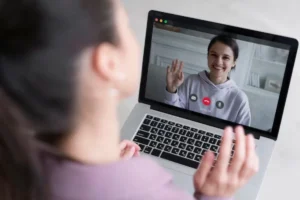The Health Blog

The Importance of Digital Detox for Remote Workers
The shift to remote work has quietly blurred the boundaries between screen time and real time. Without a commute or physical office, many remote workers find themselves online longer, with fewer breaks and higher stress levels.
That’s where digital detoxing comes in — not as a punishment, but as a reset. This article will explore why stepping away from your devices is essential for your mental health, productivity, and creativity. And more importantly, how you can build screen-free space into your remote life without missing a beat.
Why screen time spikes for remote workers
When your home is your office, it’s hard to switch off
Remote work removes many traditional workplace stressors, but it replaces them with a new problem: screen saturation. You might start your day with Slack, hop on Zoom, juggle three tabs for a report, answer emails, and then… scroll social media to relax.
The average adult already spends over 11 hours a day engaging with screens. For remote workers, that number can easily climb higher due to:
- Lack of in-person meetings or physical collaboration
- Compensating for visibility with more communication
- Reduced “natural” breaks like walking to meetings
- Digital multitasking as a form of productivity theatre
It’s no wonder many remote workers report digital fatigue, eye strain, insomnia, and a constant feeling of being “on.”
What is a digital detox — and why does it matter?

It’s not about quitting tech — it’s about reclaiming control
A digital detox means intentionally stepping away from your screens — phones, laptops, tablets — for a set period of time to focus on offline activities. This doesn’t mean you’re going off the grid. It’s about creating healthy boundaries so technology serves you, not the other way around.
Benefits of regular digital detoxes include:
- Improved focus and reduced brain fog
- Better sleep and circadian rhythm regulation
- Healthier posture and reduced eye strain
- Stronger in-person relationships and communication
- More creative thinking and spontaneous problem solving
In remote roles especially, carving out offline time isn’t a luxury. It’s a necessity for sustainable productivity and wellbeing.
Signs you may need a digital detox
Even if you love working remotely, your body and mind might be signalling it’s time to log off. Watch for these signs:
- Constant fatigue even after sleep
- Irritability during or after long screen sessions
- Shortened attention span or difficulty focusing on one task
- Headaches or eye strain by mid-afternoon
- Reduced enjoyment in non-digital activities
- Guilt or anxiety when not checking messages or emails
If any of these ring true, a digital reset could help you feel more balanced and in control.
The link between digital overload and mental health
Always online doesn’t mean always effective
While technology connects us, it also keeps us tethered. The dopamine loops from constant notifications, the stress of back-to-back video calls, and the absence of physical movement all contribute to mental fatigue.
Numerous studies have linked high screen time with increased rates of:
- Anxiety and depression
- Sleep disorders
- Burnout and emotional exhaustion
- Social withdrawal
And because remote workers are often isolated, the impact can feel even heavier. A digital detox provides much-needed space for mental recovery and emotional regulation.
If you’re experiencing persistent remote work anxiety or stress, exploring structured support through an EAP (Employee Assistance Programme) might also be beneficial. For more insight, consider our blog on employee assistance for remote workers.
Simple ways to unplug without guilt
Start small — even five minutes counts
Detoxing doesn’t require deleting your apps or moving to the woods. Begin with micro-breaks and tech-free rituals to build screen boundaries into your day:
- Tech-free mornings: Delay checking your phone for 30 minutes after waking
- Nature breaks: Step outside without your phone for fresh air or a walk
- Analogue hobbies: Read a physical book, sketch, play an instrument, or journal
- No-screen meals: Eat without scrolling or watching
- Wind-down rituals: Replace night-time scrolling with stretching, meditation, or a bath
The goal isn’t perfection — it’s consistency. Even small efforts compound into noticeable relief.
Creating a digital-free zone in your home
Physical boundaries help mental boundaries
Set up at least one space in your home that’s completely screen-free. This could be:
- A corner with a comfy chair and books
- Your dining table
- A garden bench or balcony
- Your bed (yes, really — your phone doesn’t belong there)
By designating areas where your brain doesn’t expect stimulation, you create psychological cues that promote rest, reflection, and creativity.
Reclaim your weekends: the 24-hour challenge

Want to feel the full impact of a detox? Try going screen-free for one full weekend day. That means:
- No work-related apps
- No social media
- No bingeing shows or checking emails
Instead, fill your time with:
- Outdoor adventures
- Cooking or baking
- Calling a friend (on an actual phone)
- Doing something tactile like gardening or crafting
This break helps you reset your relationship with technology, and proves that the world won’t fall apart if you take a day off notifications.
Leading by example: for team leads and managers
Your team follows your habits, not your emails
If you’re managing a remote team, your approach to screen time and responsiveness sets the tone. Model healthy boundaries by:
- Not emailing late at night or on weekends
- Taking and openly talking about digital breaks
- Encouraging camera-optional calls where possible
- Sharing articles or workshops about digital wellbeing
Your transparency invites your team to do the same, and ultimately builds a more resilient, productive culture.
For more ways to help your team reduce burnout, our article on avoiding overwork offers strategies that align perfectly with detox principles.
Digital detox ≠ , digital disconnection
You’re not quitting tech — you’re rebalancing
Detoxing doesn’t mean giving up your job, your Spotify playlists, or your favourite productivity apps. It simply means you’re choosing how and when you engage with digital tools — rather than letting them dictate your habits.
By building moments of tech-free time into your day or week, you’ll likely return to your screens feeling more focused, creative, and energised.
Conclusion: You deserve a pause
Being a remote worker means your screen is your lifeline — to colleagues, to work, and sometimes to the outside world. But too much of a good thing can turn toxic. A digital detox isn’t about deprivation. It’s about protection.
Protecting your focus, your body, your time, and your mind.
You don’t need to disappear from the internet or abandon your devices. You just need to create breathing space — moments when you exist offline, in the real world, on your own terms.
So take a walk. Close the laptop. Put the phone in another room. Choose stillness — even for a little while. Your brain (and your future self) will thank you.









